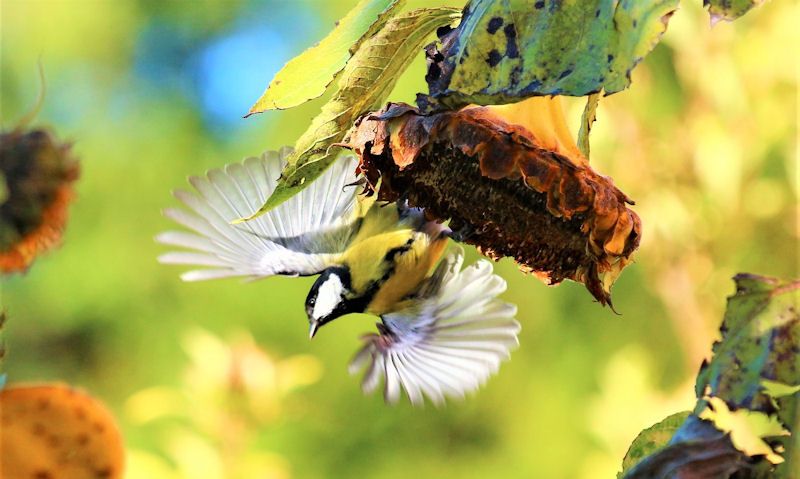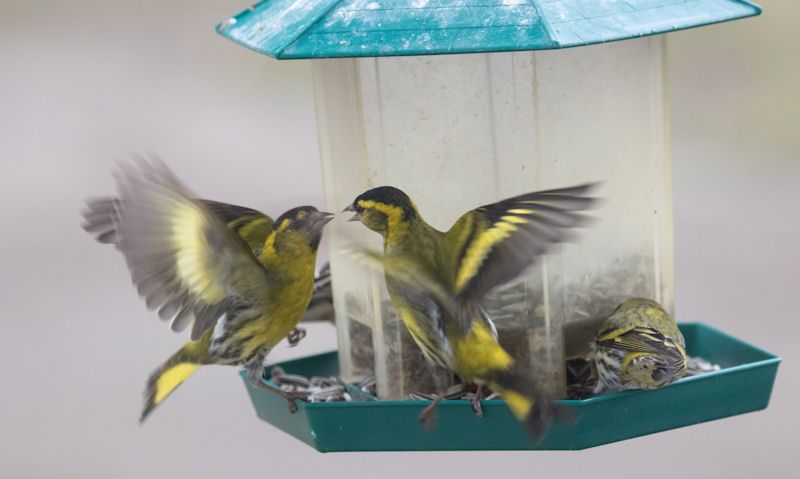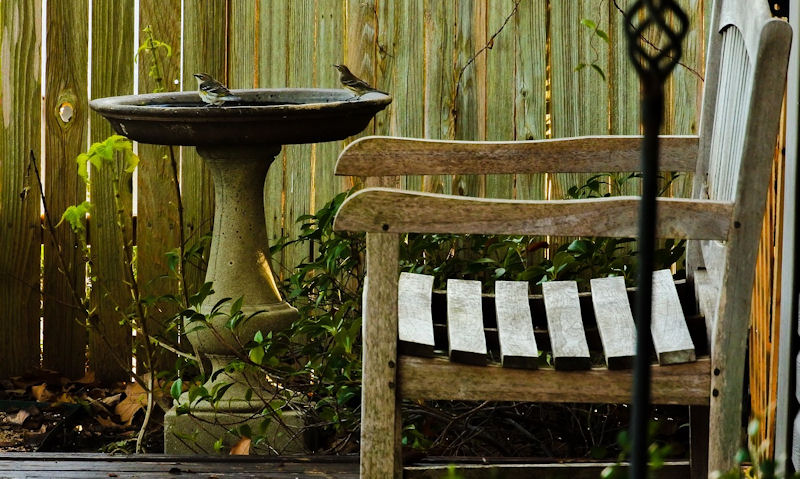12 Summer bird feeding tips
Well its easy to just leave out all types of bird feed in the garden; priority should be put on high protein food as its the nutrients they need during the summer months.
In the summer its vital wild birds get a generous helping of protein to survive through the summer, along with there hacklings. Much of which can be found in bird seeds with sunflower seed, crushed peanut, pet food or cheese all contain protein and are safe for birds.
You don't have to follow a strict routine well feeding wild birds in your garden during the summer months.
What you will need to do is just to make sure there's enough protein in there diet to help them get those all important nutrients they require over the summer.
We've outlined twelve summer bird feeding tips that should apply to most people, though its possible all tips won't be possible to follow for everyone.
Instead prioritise there favourite foods with protein; all seed mixes offer such, but so do fruits as well has having vitamins for energy.
Avoid breads at this time of year at it doesn't offer much now or anytime, but it is possible to feed pet food to wild birds if you're short of specialty bird feed.
Once you've taken our tips on board, remember to keep the feeding area clean for hygiene reasons, well leaving out fresh water for birds everyday.
1. Summer favourite foods
Make no mistake, well its perfectly acceptable to feed wild birds all types of feed that prioritises say... vitamins over protein, still offering protein rich food is important.
If the case of seeds, all mixes will do, with a focus more on quality sunflower seeds in the black or heart seed mix range.
It would be possible to offer them nyjer seeds if you have them, though buy sunflower seeds if haven't bought any already.
Well nut mixes are also high in protein and must be strongly considered, its recommended by the RSPB to only offer finely crushed or chopped nuts.
If you feel you must put out peanuts, only do so in suitable mesh feeders that will not allow sizeable pieces of peanuts to be taken, reducing the choking risk to chicks - RSPB
This should prevent the hackling's from choking as the adults bring feed back to the nest for the young.
2. Food to avoid in summer months
We talk mostly about foods to feed birds in the summer time, but lets remove all other options that should be avoided at all costs.
Well focus should be on protein foods, its possible much of that can be found in foods that shouldn't really be offered to birds at this time of the year.
That also goes for food people eat that is not suitable for wild birds anytime.
And it can't be said enough with bread, or white bread in partially should not be fed to birds in the summer or during the rest of the year.
That's with the exception of wholemeal or multi-seeded bread that has a mix of seeds baked into the crust.
Avoid feeding the whole slices of bread and instead only leave out the crusts where it contains the protain rich seeds.
Fat balls or suet block can be fed to wild birds as they contain all the important food groups that wild birds require.
Problem with that is they're bonded with lard or fat, of which will melt or go stale under the heat of the summer sun, so only locate suet blocks or fat balls in the shade.
If its an acceptionly hot day, shade or not, the heat alone will distroy the fat balls.
3. Peanut mixes with care
Peanuts are very important for wild birds diet all year round, but why does the exclusion of peanuts during the summer matter...
Let's delve a little more in the use of peanuts over the summer time...
You can feed peanuts to wild birds over the summer as they contain more protein than any other food source you can supply birds.
But there's a catch, its possible there chicks can choke on nuts if fed to them.
Solution to this is only hand out peanuts in the feeder that are pre-crushed by you, thus forcing the birds to only take small pieces.
To be fair birds will still attempt to crush the peanuts themselves into smaller pieces, but its a good idea to do so yourselve before leaving them out in the garden.
Once more, rather than using the standard peanut bird feeder you can buy, shop around for one that has smaller gaps to force the birds to break them up more to bring crush nuts back through the small openings.
If a small peanut feeder is not within your reach, not a problem. Simply crush the peanuts before leaving them out in a pile on the bird dish or tray.
Its not limited to peanuts mind you, it would also be possible to supply wild birds a helping of unsalted almond nuts, walnuts or similar nuts which we eat ourselves.
4. Pet food
One source of protein comes in dog or cat food for your pets at home. And that same can of pet food can be fed to wild birds out in the garden.
We're not talking about the dry pet food kind either, even though it is safe and suitable.
Its the wet pet food mixes we're talking about that can be scooped out of the can and piled up into the cat or dog bowl.
Problem with use of pet food is its stinky with the likelihood of leaving a smell behind.
With that in mind you'll need to leave out pet food on a dish or tray that is for use with wild bird feed only, set out in the garden.
If you don't have a tray/dish then pick up a cheap small plate or use one of your own in the kitchen, well using it exclusively for wild birds.
However, where there's dog or cat food left outside its likely to attract some unwanted attention; the neighbours cats or foxes, with crows or magpies.
Taking on board the possibility of this happening, only leave out pet food in the garden where you can observe what's going on the entire time.
That way you can scare off unwanted guests, well removing the plate once the pet food has been gobbled up by the smaller, kinder birds you want to attract.
5. Continuously supply of feed
High in protein or vitamins a plenty, during the summer its vital you always have a continuous supply of bird feed set out in the garden.
What that means for you is always keeping the bird feeders filled to the top, weather you've taken our advice on board to only feed protein rich food, or you decide to go with what you already feed them.
Topping up bird feeders doesn't have to happen everyday nor do you have to do so when the level drops a little bit.
But only do so during the quieter times in the day as to not disrupt there eating habits.
Rather than going out in the garden to refill or check on the feeders; do so only in the late evening - well its still light so you can see - in a time when birds have gone away.
All this will happen around the bird feeding station which should be in a convenient location, though wall hanging feeders on brackets should be within reach.
If not this is likely to discourage you from refilling feeders, thereby you won't get in the habit of topping up feeders when its required.
6. Locate feeders in shade
Trouble with the summer it brings the lifespan of the bird food in the feeders to an end very quickly, with the germination process quickly sped up.
Its possible to locate feeders out of the sun well positioning them in an area in the garden that is in shade all day long.
The sun moves across the sky throughout the day before it sets to the south/west.
So its not a simple case of finding shaded spot in a random time of the day. What you'd need to do is observe for a time as to know where the area stays shaded the most.
If its in a garden that is facing north/south, then use the north facing garden as the area to setup the feeding station, preferably close to the house if that's doable.
However, if you're using the south facing garden with no cover, to put it likely... you're screwed in terms of shade.
If you have a tree then brilliant, make use of it by positioning the feeders in the area that's the most shaded part throughout the day, but it won't likely be shaded all day.
It may also be possible to piggyback of the neighbours house or structure that creates shade over your garden, so make the most of it.
You've found the most shaded location in your garden, but you'll still need to consider the heat that will still cause the food to rot quickly in the feeders.
All you can do here is not to pack in the feed as to give it a little breathing space.
You can use less feed as to not let much go to waste, then empty it before refilling every evening to try and keep it fresh.
7. Keep lawn cut short for ground feeders
To be honest, ground feeding birds are perfectly capable of feeding off your garden lawn if it hasn't been cut recently.
In fact for most people, with a drop of rain the lawn is likely to shoot up soon after you've slaved your butt off doing the gardening.
You must know it won't bother garden birds either way.
As it happens the longer the grass is untouched, it likely to encourage insects and bugs to make use of it, thus bringing in ground feeding birds to scavenge.
We suggest keeping the lawn cut short for your benefits only, for three reasons:
- Firstly, so that you can admire the small garden birds wondering around your lawn as they walk around pecking on insects and bugs
- Secondly, if insects or bugs are in short supply you can throw dried or live mealworms over the lawn, which would be helped with cut short grass
- Thirdly, and as we explain in detail further down this page, you may need to use the hosepipe to help draw out earthworms to assist garden birds
8. Allow plants to bloom
If you have not got beautiful, colourful plants in your garden yet, there's no time like the present during the summer as the seeds will soon grow in over the next month of so.
You can also cut corners by buying already grown plants from a garden centre.
But why would we suggest the use of flowers or plants to help feed wild birds.
Well for starters, blooming flowers and plants draw in insects and bugs, so birds that eat off the ground are likely to be enticed into your garden due to this alone.
Its also possible wild birds can catch flying insects in mid-air, or go where insects breed under the more dense blooming ground grown plants or flowers.
Apart from using plants to entire insects and bugs, plants mean natural cover for birds.
By that we mean wild birds need cover as they feed from your garden; its for taking cover when people pass, or just to stay out of the way until the time to feed arises.
And they won't be able to do so if there's no plants with in sight of the bird feeders.
Plants can be grown in pots, in the soil around the garden boundary, or if you like planted in baskets in hanging flower pots.
9. Draw out earthworms with sprinklers
If the hot summer has a long spell of dry weather, this will cause the turf to dry over with a hard crust that would not be made easy for wild birds to dig under.
Well earthworms will stay underground as long as the weather is dry, there's no chance ground feeding wild birds will get a nutritious meal.
You can substitute lack of live earthworms by throwing out live mealworms over the lawn, but that comes at a cost.
Simple solution to this is drenching the lawn as to force worms to the surface.
That way the wild birds have a short window to scoop down in your garden as they feed on the earthworms that make there way to the top.
Problem is lots of water will be needed, so providing there's no risk of a water shortage or hosepipe ban, water the lawn for up to an hour at a time.
No need to use the sprinklers over the entire garden; focus on a quarter of the garden as to not waste to much water - which will cost you a fortune.
Inspect the area once in a while to see if worms are coming to the surface, if not then perhaps its time to focus on another part of the garden.
If no wild birds are taking advantage of your generosity, you could always collect the worms yourself then leave them out in the bird feeding tray or dish.
10. Offer them fruit for vitamins
There's never a bad time to leave out fresh fruit for wild birds, and well most are rich in vitamins, they're also high in protein.
With that, feed wild birds a cut up apple or leave it impaled on a spike for birds to help themselves as they eat the flesh or sip the juice.
Citrus fruit is also a good fruit to offer them, though you're likely to get less interest in feeding oranges to birds - including lemons, limes, grapefruit, etc.
Though you should prioritise berries over all other fruits as its the thing common British bird are likely to eat out in the wild.
Try raspberries, blueberries or try feeding grapes to birds, you should get a lot of interest from small garden birds.
If feeding birds dried sultanas or raisins, it might be wise to soak them in warm water just to revitalise them a little, well making them juicy again.
All types of stone fruit can also be offered, and that goes for peaches, nectarines, cherries, mango or plums.
If you can spare half a dozen, you can also feed birds lovely strawberries well feeding them whole or cut them in half.
11. Water source
Our summer feeding tips is not limited to bird food only, in the hot summer months feeding fresh water for drinking or bathing in is more important than ever.
In long dry spells that will probably happen some point during the summer, lack of rain will be hugely missed as birds rely on it for drinking.
Those rain drops that form on anything from roof tops to parked vehicles, or more in nature on leaves or puddles on the ground, the birds need it.
When there's no rain, there's no where for birds to drink water.
So what do they do, they source water in people's gardens that will hopefully be left out for them daily in a bird bath or hanging up in a water dish.
Prioritise fresh water as much as you do when leaving out bird peanuts, seeds or fat balls hanging up in the feeders.
There's really no need to invest in a bird bath if you don't want to, you just need to leave out an object in the garden that will collect rain water or you can fill it up yourself.
That could be an upside down bin lid, tray or a dip on an otherwise flat surface.
12. Regular cleaning schedule
Finally, you may be generous leaving out a mix of high protein feed over the course of the season, along with a water source to drink and bathe.
But have you put as much effort into to feeding wild birds than considering there health if they're left to feed on unsafe feeders or drink unclean water.
So you do need to clean out all those bird feeders on a regular basis, once a week should do it, but twice a week if you can would be better still.
When most people top up the feeders with fresh feedd they rarely clean feeders beforehand, so slowly the bacteria builds from the feed that hasn't been removed.
To clean bird feeders thoroughly, you'll need to take them off there brackets and soak them for a long period in hot soapy water.
Then scrub them thoroughly with a hard brush but no so much if its wooden feeder.
That goes for all mesh, clear plastic tub and cage feeders that usually hang up.
Let's not forget all feeders made from wood either, with the bird table needing the surface to be scraped before washing it with soap.


